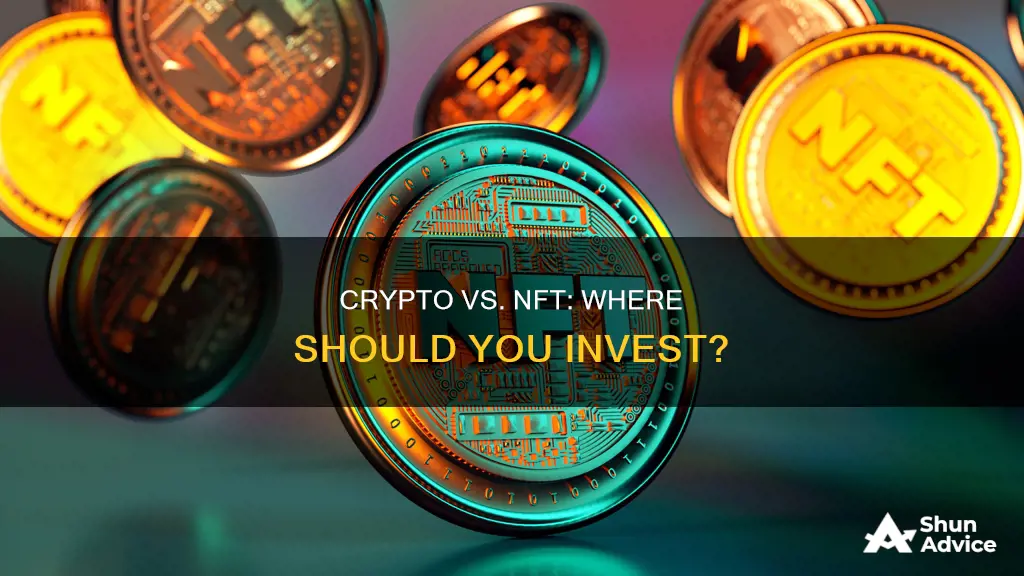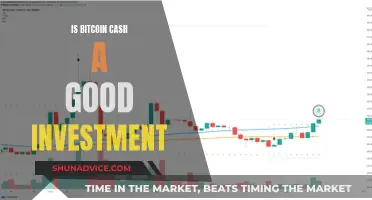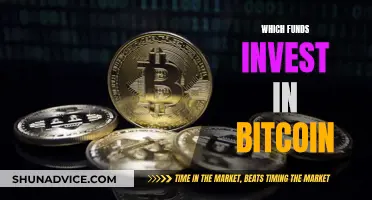
Non-fungible tokens (NFTs) and cryptocurrencies are both based on blockchain technology. NFTs represent ownership of a specific digital asset, like a digital painting, and are usually bought and sold in online marketplaces. On the other hand, cryptocurrencies are fungible, meaning they can be exchanged for another good or asset of equal value.
Both NFTs and cryptocurrencies are highly speculative investments. NFTs are susceptible to market manipulation, fraud, and scams, and the regulatory environment for digital assets is still evolving. Cryptocurrencies are also subject to high fluctuations in value and can result in a complete loss.
Before investing in either NFTs or cryptocurrencies, it is essential to carefully consider the risks and conduct thorough research.
| Characteristics | Values |
|---|---|
| Accessibility | Anyone with a working computer, an internet connection, and knowledge of NFT marketplaces can invest in NFTs. |
| Open to the public | Yes |
| Ownership | NFTs establish a clear chain of ownership over an asset. |
| Fraud prevention | NFTs are minted and hosted on blockchain technology, which is a tamper-proof ledger, making it easier to prove ownership and harder to challenge in court. |
| Market regulation | NFTs are an unregulated asset class with little to no investment laws and consumer protections in most jurisdictions. |
| Volatility | The NFT market is highly volatile. |
| Long-term value | The long-term value of NFTs is uncertain and will fluctuate based on demand for the work itself. |
What You'll Learn
- NFTs are unique digital assets, bought and sold online using cryptocurrency
- NFTs are built and managed on a blockchain, the same digital ledger technology system used by Bitcoin
- NFTs can be used to guarantee ownership of a physical asset
- NFTs are susceptible to market manipulation, fraud, scams, and money laundering
- The NFT market is highly volatile and unpredictable

NFTs are unique digital assets, bought and sold online using cryptocurrency
Non-fungible tokens (NFTs) are unique digital assets bought and sold online, often using cryptocurrency. They are generally encoded with the same underlying software as many cryptos, but they are not interchangeable with each other, unlike cryptocurrencies. NFTs are created through a process called minting, where the asset's information is encrypted and recorded on a blockchain. Each NFT has a unique digital signature, making it impossible to be replaced with something else.
NFTs can be used to represent ownership of digital or physical assets, such as artwork, music, in-game items, videos, and even tweets. They can also be used to represent individuals' identities, property rights, and more. The tokenised assets can be bought, sold, and traded more efficiently, while reducing the probability of fraud.
The market for NFTs is still relatively new and highly speculative, with sales hitting a monthly record of nearly $5 billion in August 2021. The popularity of NFTs has led to the development of NFT marketplaces, such as OpenSea, Rarible, and Foundation, where users can buy, sell, and trade NFTs.
Investing in NFTs comes with certain risks, including the highly volatile nature of the market, the potential for fraud and scams, and the environmental impact of the blockchain technology used to create and verify transactions. Additionally, the regulatory environment for digital assets is currently in flux, which could impact the future of the NFT market.
When considering investing in NFTs, it is important to do thorough research, understand the risks, and proceed with caution. NFTs may be a good investment for those who have money to spare and are interested in digital assets or collecting unique items.
TheStreet's Guide to Investing in Bitcoin
You may want to see also

NFTs are built and managed on a blockchain, the same digital ledger technology system used by Bitcoin
Non-fungible tokens (NFTs) are built and managed on a blockchain, the same digital ledger technology system used by Bitcoin. This technology allows NFTs to be authenticated and tracked.
NFTs are created through a special Ethereum-based computer program called a "smart contract". These contracts follow certain rules and standards that determine what the contract can do. The NFT smart contract can create NFTs, assign ownership, and give each NFT a unique ID. The uniqueness of each NFT enables the tokenisation of things like art, collectibles, or even real estate.
The blockchain technology used by NFTs allows ownership of an asset to be publicly verifiable. This is useful for artists, who can guarantee the authenticity of their work and monetise it as NFTs. It also allows for fractional ownership, where ownership of items can be divided up and resold quickly through primary and secondary markets.
While NFTs are built on blockchain, the digital files they reference are often stored separately. This is because the large size of such files and the limited processing speed of blockchains would make it difficult to store them directly on the blockchain. Instead, a web address is included in the NFT that points to the location of the digital asset in question.
The blockchain technology used by NFTs has some similarities to that used by Bitcoin, but there are also some key differences. Both use blockchain ledgers to record transactions, but while Bitcoin is fungible, NFTs are non-fungible. This means that each NFT has unique properties, and they are not mutually interchangeable.
Invest in Cryptos: A Secure Future for Your Family
You may want to see also

NFTs can be used to guarantee ownership of a physical asset
Whether you should invest in crypto or NFTs depends on your risk appetite and investment goals. NFTs, or non-fungible tokens, are unique digital assets that can represent ownership of a physical or digital asset. They are stored on a blockchain, a decentralized network of computers, which provides a certificate of authenticity and acts as proof of ownership.
NFTs can also be used to guarantee ownership of unique physical assets like property, collectibles, and physical works of art. For instance, NFTs can be used to purchase land in crypto games running on the Ethereum network, allowing users to create their virtual worlds or build shops to sell items to other players.
Additionally, NFTs can be used to prove ownership of digital assets, such as digital art, music, or video game items. In this case, the NFT acts as a virtual certificate of ownership, similar to a physical certificate or title for a house or other tangible asset.
It's important to note that NFTs have their risks, including market manipulation, fraud, and the potential for counterfeit or fraudulent NFTs. The regulatory environment for NFTs is also still evolving, and there may be uncertainties regarding intellectual property rights and ownership.
Therefore, when considering investing in NFTs as a way to guarantee ownership of physical assets, it's crucial to carefully research the specific NFT project, understand the risks involved, and make sure the investment aligns with your financial goals and risk tolerance.
The Ultimate Guide to Bitcoin ETF Investing
You may want to see also

NFTs are susceptible to market manipulation, fraud, scams, and money laundering
Non-fungible tokens (NFTs) are susceptible to market manipulation, fraud, scams, and money laundering.
NFTs are bought and sold on online marketplaces, with some platforms allowing fractional ownership. The marketplaces can be used to buy an NFT at a fixed price or function as a virtual auction, much like the exchange system for buying and selling cryptocurrencies and stocks. Prices on NFTs listed for sale via auction are therefore volatile, changing in value depending on demand.
The lack of regulation in the NFT market makes it susceptible to market manipulation. Misinformation and speculative hype contribute to inflated prices, volatility, and pump-and-dump schemes. The remote nature of NFT transactions also makes it difficult to vet physical goods, maintain compliance with anti-money laundering (AML) laws, and verify the authenticity of the goods.
NFTs are also vulnerable to fraud and scams. Criminals can easily prey on unsuspecting buyers and sellers as anyone can make claims about an NFT, execute an NFT transaction, and set up an NFT marketplace online. Some common NFT scams include phishing frauds, counterfeit NFTs, and rug pulls. In 2022, CryptoBatz fell victim to a phishing scam a few days after its launch, and scammers stole almost $3 million worth of BAYC NFTs from the project's official Instagram page.
Additionally, NFT platforms "lack appropriate controls" to combat money laundering and sanctions evasion, according to a U.S. Treasury report. NFT wash trading is one form of market manipulation where a seller is on both sides of a trade, selling an asset to themselves to inflate its value artificially. This scheme can be easily executed on NFT trading platforms that allow users to trade by simply connecting their wallet, with no need for identification.
Given these risks, investors considering NFTs should thoroughly research the potential purchase, the reputation of the original NFT seller, and the track record and star power of the creators.
DIA Cryptocurrency: Why You Should Invest Now
You may want to see also

The NFT market is highly volatile and unpredictable
NFTs, or non-fungible tokens, are unique digital assets that represent ownership of a specific item, like a digital painting. They are often bought and sold using cryptocurrencies and are authenticated through blockchain technology. While NFTs have become increasingly popular, particularly in the art world, their market is highly volatile and subject to significant price fluctuations.
For example, Twitter CEO Jack Dorsey's first tweet was sold as an NFT for $22.9 million in March 2021. However, when it was put back on the market in April 2022, it failed to attract bids above $280. This extreme volatility is not uncommon in the NFT market and can be influenced by various factors, including the broader cryptocurrency market, regulatory changes, and community dynamics.
The unpredictable nature of the NFT market is also evident in its rapid growth and subsequent decline. In August 2021, NFT sales hit a monthly record of nearly $5 billion, but by June 2022, sales had steeply declined along with the value of cryptocurrencies. This volatility is further exacerbated by the lack of market regulation, making NFTs susceptible to market manipulation, fraud, and speculative hype.
Additionally, the value of NFTs is closely tied to the strength of the communities supporting them. "Blue-chip" NFT projects with massive followings, such as Doodles, Cool Cats, and Apes, tend to be more stable and attract institutional investment. In contrast, NFTs without a strong community or real-world utility may struggle to maintain their value over time.
Furthermore, the NFT market's unpredictability is partly due to its infancy. As a new asset class, NFTs are still finding their place in the digital economy, and their long-term viability is uncertain. While some believe NFTs are a passing fad, others argue that they represent the future of digital ownership and have yet to reach their full potential.
In conclusion, the NFT market is highly volatile and unpredictable, with prices fluctuating due to various factors, including community dynamics, regulatory changes, and the broader cryptocurrency market. As a nascent asset class, NFTs are subject to speculation and market manipulation, making them a risky investment. However, despite their volatility, NFTs continue to attract investors and collectors alike, drawn by the potential for future applications and the promise of digital ownership.
Doge Coin Stock Investment: Where to Invest?
You may want to see also







